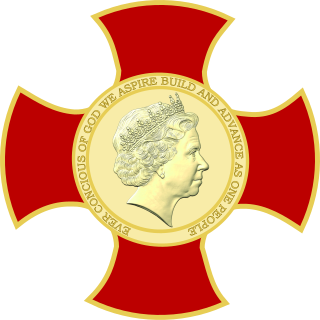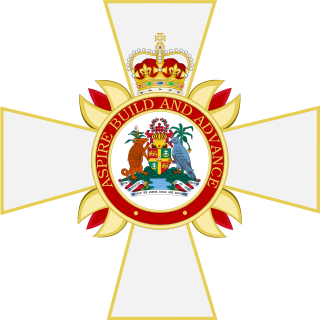
The Most Excellent Order of the British Empire is a British order of chivalry, rewarding contributions to the arts and sciences, work with charitable and welfare organizations, and public service outside the civil service. It was established on 4 June 1917 by King George V and comprises five classes across both civil and military divisions, the most senior two of which make the recipient either a knight if male or dame if female. There is also the related British Empire Medal, whose recipients are affiliated with, but not members of, the order.
Sir is a formal honorific address in English for men, derived from Sire in the High Middle Ages. Both are derived from the old French "Sieur" (Lord), brought to England by the French-speaking Normans, and which now exist in French only as part of "Monsieur", with the equivalent "My Lord" in English. Traditionally, as governed by law and custom, Sir is used for men who are knights and belong to certain orders of chivalry, as well as later applied to baronets and other offices. As the female equivalent for knighthood is damehood, the suo jure female equivalent term is typically Dame. The wife of a knight or baronet tends to be addressed as Lady, although a few exceptions and interchanges of these uses exist.
Commander is a common naval officer rank as well as a job title in many armies. Commander is also used as a rank or title in other formal organizations, including several police forces. In several countries this naval rank is termed frigate captain.

The Most Honourable Order of the Bath is a British order of chivalry founded by King George I on 18 May 1725. Recipients of the Order are usually senior military officers or senior civil servants, and the monarch awards it on the advice of His Majesty's Government. The name derives from an elaborate medieval ceremony for preparing a candidate to receive his knighthood, of which ritual bathing was an element. While not all knights went through such an elaborate ceremony, knights so created were known as "knights of the Bath".

The Most Distinguished Order of Saint Michael and Saint George is a British order of chivalry founded on 28 April 1818 by George, Prince of Wales, while he was acting as prince regent for his father, King George III. It is named in honour of two military saints, Michael and George.

The Order of St John, short for Most Venerable Order of the Hospital of Saint John of Jerusalem and also known as St John International, is an order of chivalry constituted in 1888 by royal charter from Queen Victoria and dedicated to St John the Baptist.

The Royal Victorian Order is a dynastic order of knighthood established in 1896 by Queen Victoria. It recognises distinguished personal service to the monarch, members of the royal family, or to any viceroy or senior representative of the monarch. The present monarch, King Charles III, is the sovereign of the order. The order's motto is Victoria. The order's official day is 20 June. The order's chapel is the Savoy Chapel in London.

Grand Cross is the highest class in many orders, and manifested in its insignia. Exceptionally, the highest class may be referred to as Grand Cordon or equivalent. In other cases, there may exist a rank even higher than Grand Cross, e.g. Grand Collar. In rare cases, the insignia itself is referred to as the "grand cross".

The Order of Leopold is one of the three current Belgian national honorary orders of knighthood. It is the oldest and highest order of Belgium and is named in honour of its founder, King Leopold I. It consists of a military, a maritime and a civil division. The maritime division is only awarded to personnel of the merchant navy, and the military division to military personnel. The decoration was established on 11 July 1832 and is awarded by Royal decree.

The Order of Orange-Nassau is a civil and military Dutch order of chivalry founded on 4 April 1892 by the queen regent, Emma of the Netherlands.
Commander, or Knight Commander, is a title of honor prevalent in chivalric orders and fraternal orders.

The Royal Order of Isabella the Catholic is a knighthood and one of the three preeminent orders of merit bestowed by the Kingdom of Spain, alongside the Order of Charles III and the Order of Civil Merit. It recognizes extraordinary services to the homeland or the promotion of international relations and cooperation with other nations, with a particular focus on the territories of the former Spanish Empire. By law, its Grand Master is the King of Spain, and its Grand Chancellor is the Minister of Foreign Affairs. The Order is open to both Spaniards and foreigners, particularly from the Spanish-speaking world.
The Order of Saint Lucia is an order of chivalry established in 1986 by Elizabeth II. The Order comprises seven classes. In decreasing order of seniority, these are:

The Royal Order of Civil Merit is a knighthood and one of the three preeminent orders of merit bestowed by the Kingdom of Spain, alongside the Order of Charles III and the Order of Isabella the Catholic. Each of the three orders aims to reward a distinct type of achievement without one outranking the others, although they are sometimes sorted by their year of inception. The Order of Charles III primarily honors heads of state and high-ranking government officials, while the Order of Isabella the Catholic primarily rewards services that strengthen diplomatic relations across the former Spanish Empire. In contrast, the Order of Civil Merit was created by King Alfonso XIII of Spain in 1926 to recognize "the civic virtues of the officials in the service of the State, as well as the extraordinary services of Spanish and foreign citizens for the good of the Nation." It was, therefore, founded as a modern order of merit, dedicated to acknowledging exceptional deeds for the benefit of civil society.

The Most Distinguished Order of the Nation is an Antiguan and Barbudan order of chivalry recognising distinguished and outstanding service to Antigua and Barbuda, the CARICOM region or the international community. Originally established by the National Awards Act 1987, that act was repealed and the order was re-established and constituted by the Parliament of Antigua and Barbuda under the National Honours Act 1998 which received Royal Assent from the Governor General of Antigua and Barbuda on 31 December 1998.

The Order of Grenada is an order of chivalry and a society of honour instituted by Queen Elizabeth II in right of Grenada through the Grenada National Honours Act of 1994. The Order was subsequently reconstituted and substantially reformed by the National Honours and Awards Act of 2007.

The Royal Order of the Elephant of Godenu is a dynastic Order of Merit in the sub-national kingdom of Godenu, Volta Region of Ghana.
Gbi-Godenu is a divisional chieftaincy of the traditional area of Hohoe recognized within of the Constitution of Ghana and legislation regulating the "Headquarters" in Ghanaian society. It is located in the Volta River region of Ghana.

The Most Distinguished Order of the Nation is an order of chivalry which forms part of the overarching Order of Grenada, a society of honour instituted by Queen Elizabeth II in right of Grenada. The Order was formed following the reforms to the Order of Grenada enacted by the National Honours and Awards Act, which having been passed by the House of Representatives of Grenada on 16 November 2007 and passed by the Senate of Grenada on 27 November 2007 received Royal Assent on 31 December 2007.
















